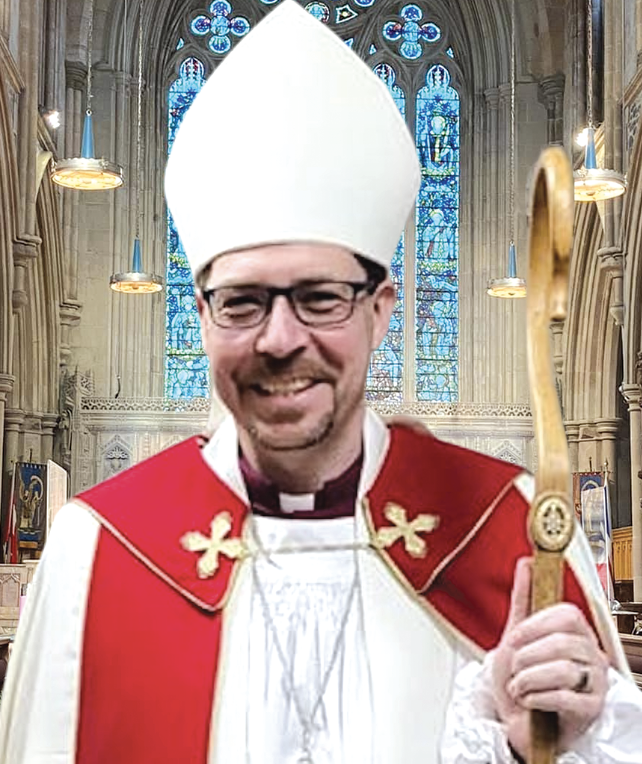What do you think is the hardest part about following Jesus? Do you think the most challenging part is letting others know you are a Christian?
Sure, we can wear a cross or talk about the Church. We can say our prayers and read the Bible. But do other people know that you are a Christian? Do you know you are a Christian?
You might say, “But we are Anglicans; we are not Christians!” That is only half true; you are indeed a Christian! Just knowing that is a great place to start!
As part of our diocese’s strategic plan, called “Set Sail: Charting the Course for Christ’s Church,” I have asked the people of the Diocese of Eastern Newfoundland & Labrador to look more closely at their relationship with God and each other. One of the ways we can do that is by deepening these relationships. We can do nothing in this diocese if we do not start with God. If we are to do anything, we must renew our relationship with God and one another.
I believe the foundation lies in deepening relationships. Nothing will be rebuilt or fixed outside of us unless we go deep within ourselves with God. I’m speaking of a spiritual renovation and revival in this diocese. That will mean looking at our relationship with God and God’s people in God’s world.
How is your relationship with God? In other words, “Do you love Jesus?” It is a personal question, but one that is so important. We go to the doctor occasionally for a physical or a check-up. Our spiritual health is no different.
We can do this spiritual check-up by looking at what we are called to be and to do as baptized Christians. That will mean inviting every baptized person to renew their faith by regularly examining the Baptismal Covenant.
Do you believe in God the Father, Son, and Holy Spirit?
We start by saying, “I believe.” That is faith.
Faith says, “I believe in God.” God is the universe’s creator, ruler, and source of all love and authority.
Faith says, “I believe in Jesus.” Jesus is God in human form, sent as the Saviour of humanity and the one through whom we can have a personal relationship with God.
Faith says, “I believe in the Holy Spirit.” The Holy Spirit is the active presence of God in the world. The Spirit is “God in action,” responsible for inspiring and guiding believers with spiritual gifts needed to fulfill our purpose in life.
And by saying, “I believe in God, the Father, Son, and Holy Spirit,” the logical question should be, what is expected of me as a believer? How do I live day by day as a Christian?
To answer this, we must begin at the beginning, which is our baptism. In baptism, we promise to accept the responsibilities of living a Christian life, and the Baptismal Covenant is a way to see how we are doing.
Will you continue in the apostles’ teaching and fellowship, in the breaking of bread, and in the prayers?
What does this mean for us?
It means we commit to continue growing in our faith and being active participants in the Christian community through learning and following the teachings of Jesus Christ as passed down through the Apostles. It means reading and studying the Bible and committing to participating in the church’s life in worship, fellowship, and action. We build relationships with other believers through worshiping together, chiefly in receiving the Holy Eucharist, where all are welcome. We are also expected to have a regular prayer life, an essential part of Christian practice in deepening our relationship with God.
Will you persevere in resisting evil and, whenever you fall into sin, repent and return to the Lord?
What does this mean for us?
It means we promise to turn away from choosing things which cause harm to others and ourselves. The old cartoon with the devil on one shoulder and the angel on the other is a great way to understand it. We are tempted daily to choose a path which can either help or hurt. And because no one is perfect and we all make bad choices, when we mess up and cause harm and hurt, we promise to recognize our mistakes, confess these sins to God, seek forgiveness and strive to be better. In essence, we realize our mistakes, say we are sorry and commit to making better decisions that reflect God’s love in the future.
Will you proclaim by word and example the good news of God in Christ?
What does this mean?
Our commitment is to share the message of the Good News with others that God loves them. God’s love was shown in the words and actions of Jesus Christ, God’s only Son. God sent Jesus to save us from our mistakes (sins) by giving his life for everyone by dying on the Cross and rising from the dead. When we believe, we have faith that God the Son (Jesus) has saved humanity and has restored our relationship with God the Father, and even after we die, we will live with God forever. This is the purest form of love that exists. Not only do we tell others about this love, but we are also to show this love through how we treat others. We are called to be examples to others by showing kindness, forgiveness, and love as a way to share our faith in God.
There is a lot to say about our Baptismal Covenant and a deepening relationship with God and with others, so Bishop Rose will continue with the breakdown of each point in his next column for Anglican Life which will be published after the summer break.


